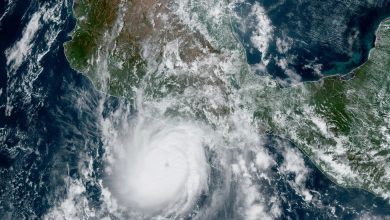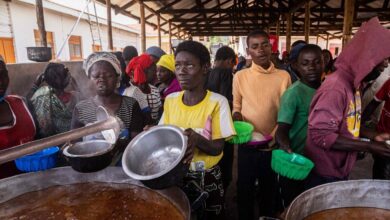An Author Wrote About Her Sister’s Murder. It Led to a Breakthrough.

It took Cristina Rivera Garza 30 years to write the story of her sister’s unsolved murder.
When she did, the book came as part of a collective call for justice in one of the world’s most dangerous countries for women. It also shed light on aspects of her sister’s life that Rivera Garza had never known — and, as she shared on social media last week, led to the first real breakthrough in the case in decades.
“The legal process was stalling, it was very slow, I didn’t see any kind of clear commitment on the side of the authorities,” Rivera Garza said. “I wanted the book to also help.”
On July 16, 1990, Liliana Rivera Garza was found dead in her apartment in Azcapotzalco, a working-class borough of Mexico City. She was 20, an architecture student with an ear for poetry and a penchant for writing letters on grid-paper notepads.
By the time an arrest warrant was filed for Liliana’s ex-boyfriend months later, he had disappeared. She became one of the hundreds of women killed with impunity in Mexico every year. Rivera Garza was left with a slowly vanishing outline of her sister — and boxes of letters, diary entries and poems in Liliana’s own hand that, until January 2020, she dared not open.
“I was able finally to gather the courage to open up the boxes in which we had placed my sister’s belongings,” Rivera Garza said. “I got access to, in a way, instructions that she left for me about how to go about telling the story of her life.”
The book, “El Invencible Verano de Liliana,” was published in Spanish by Literatura Random House last year, with an English version, tentatively called “Liliana’s Invincible Summer: A Sister’s Memoir,” planned for release in 2023 by Hogarth. In it, Rivera Garza reconstructsthe events and relationships that preceded her sister’s murder, and restores Liliana’s voice by weaving into the narrative snippets from the meticulous archive her sister left behind.
The publication comes at a watershed moment for women’s rights in Mexico. A powerful, grass roots protest movement has grown and poured into the streets, repeatedly demanding greater protections and rights and drawing attention to cases of violence against women.
The process of writing the book has, three decades later, also pushed Liliana’s case forward.
To accompany the book’s publication, Rivera Garza opened an email account to collect any new information about the man who was wanted in connection with Liliana’s murder.
Through the account, she got a tip from a credible source in August that he had likely been living in Southern California under an assumed name. She was able to see his photo, but only on an online memorial website: He died in 2020.
Rivera Garza asked for help from law enforcement contacts in the U.S. to corroborate the story, and now believes that the man in the photo was indeed Liliana’s ex-boyfriend. She is waiting for final confirmation from Mexican authorities.
That outcome initially disappointed Rivera Garza, thrusting her back into a familiar cycle of grief and guilt: if only she had started her search sooner, if only her sister hadn’t moved to Mexico City, if only. But she then began to contemplate the purpose of her book, and what she ultimately hoped to achieve by documenting Liliana’s story.
“There is a larger concept of justice that involves the preservation of memory and the truth, as well,” Rivera Garza said. “I realized little by little that the book in fact was trying to do that work.”
Rivera Garza came to see mourning as a communal process. The book was “written from a wound that I share with so many other families in Mexico, Latin America, and around the world,” she said.
Justice of any kind has been hard to come by for women like Liliana. In Mexico, more than 1,000 murders last year were officially classified as femicides — the killing of women and girls because of their gender. At least half of reported femicides in the country go unresolved, according to Impunidad Cero, a think tank. And most violence against women isn’t reported at all.
For Rivera Garza, finding a way to write about her sister’s death, even in the context of such pervasive violence, was a challenge. At the time, cases like Liliana’s were often described in the press and historical records as “crimes of passion,” a construction Rivera Garza said implicitly blamed the victim while exonerating the accused. This lack of a “dignified and respectful language” prevented Rivera Garza from writing her sister’s story sooner, she said.
“I had to wait for us as a community and a society to produce a language through which I could tell this story from my sister’s point of view,” Rivera Garza said.
Change came in fits and starts. The concept of femicide was adopted in the federal penal code in Mexico in 2012. In 2020, Mexico City appointed its first attorney general specifically tasked with handling femicide cases. But the issue remained a subject of debate.
That same year, federal Attorney General Alejandro Gertz Manero suggested that the special designation of femicide could create an additional hurdle to prosecution and should be eliminated. The argument was roundly dismissed by legislators and women’s rights advocates who had worked to raise awareness of femicide as a crime with distinct motivations from other homicides — and Gertz Manero walked back his suggestion.
Also, while having the laws on the books helps, it is not enough, said Martha Tagle, a former congress member who has worked extensively on legislation aimed at protecting women’s rights.
“So long as there’s a lack of will to understand the issue and apply the laws,” said Tagle, “we’ll lag behind.”
Most recent progress has been driven from the ground up. Protests on International Women’s Day, March 8, have thronged the streets and become an annual call to arms, pushing policymakers and society at large to do more to ensure women’s basic human rights.
This year, Lorena Sanmillán, an architect and writer who was touched by Rivera Garza’s work, organized an online collective reading of “El Invencible Verano de Liliana”to mark the occasion.More than 30 women, including Rivera Garza herself, read excerpts from the book.
“It’s a call for justice but also awareness, for women to see what happens, to see how things escalate and levels of violence grow,” Sanmillán said.
Rivera Garza’s book is the product of a society calling out for change, but it is also deeply personal. It is the first book she has written in both English and Spanish, rather than using a translator — part of what she feels is a “responsibility for the enunciation of every single word.”
Above all, though, “El Invencible Verano de Liliana” is the record of a woman who, against the odds, refuses to be forgotten, she said.
“Men kill women because they want to be rid of them, they want to silence them, they want to erase them from the earth,” Rivera Garza said. “This book is the moment in which Liliana is finally back with her language, her point of view, her inflections.”





